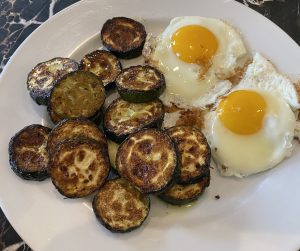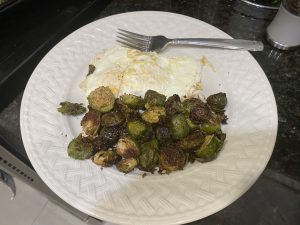Weight Loss
Breakfast Idea: Eastern Nutrition

Patients often ask me what they should eat for breakfast. Most Americans are conditioned to either skip breakfast, have something simple and unhealthy like a bagel or toast, or something “healthy” like yogurt or smoothies. While the latter might check off as such within the context of a scientific laboratory, obviously Eastern Medicines hold that uncooked foods are more difficult to digest, thereby ultimately providing us with less nutrients, in spite of having maybe started with more on the grocery shelf.
While going through Chinese Medical school my own microbiome was a minor disaster, and one of my teachers who was treating me at the time requested I eat sweet potatoes (with my eggs) for breakfast.
“You want me to eat Thanksgiving for breakfast?” I asked. He laughed and asked if I’d ever had eggs with hash browns or french fries. Of course I had, countless times.
He rhetorically asked me what the difference was —if I chopped sweet potatoes in the same way as hash browns, even adding onions to my liking. For years to follow sweet potatoes became my daily breakfast. And many of my health issues gradually improved during that time.
I became perpetually more educated in health and self-care, also about food itself. I learned that sweet potatoes are not in season for the majority of the year, which means during those periods they are, a) not as much what my body needs, and b) likely lacking in their maximum nutrients. From yams it was an easy transition to exploring other vegetables as side dishes with breakfast, which I realized was a good way to get in some daily recommended portions of greens from the start.
For many years now my breakfast has been eggs with a cooked, in-season vegetable, and would struggle to imagine starting the day any other way. In the Winter we eat a variety of root vegetables—whether roasted potatoes, carrots, radishes, or turnips—in Summer it’s more leafy greens. As for the ongoing, raging egg debate, now reignited by many functional medicine docs, all I can say is I’ve eaten eggs every single day for decades. I don’t doubt some peoples’ allergies to them, in which case they should surely avoid until that allergy is rectified. For the rest of us eggs provide invaluable nutrients in a very light, easily metabolized way. In Chinese Medicine they are said to nourish the blood, so much so that the yolk is even an ingredient in the herbal formula, “Huang Lian E Jiao Tang,” which is used to clear inflammatory heat that exists as a result of healthy systemic fluid deficiency. This “blood” benefit is probably why eggs are so highly recommended by many holistic fertility doctors.
EGGS AND “ZUCCH” (as my daughter calls it)
- Pre-heat oven to 375
- Slice squash however you like it, leave all of the slices on the cutting board, and lightly sprinkle them with salt. Let them rest for about 10 minutes (or longer) so that their excess water gets sweated out, then pat them dry.
- Add to pan with olive oil, sprinkle with salt, pepper, and whatever seasonings you like.
- Cook for 15-20 minutes, turning them over once in the middle to roast both sides
- Once almost finished cook your eggs to your liking.
- Drizzle a nice olive oil on top of them once plated
Chinese Medicine Breakfast Ideas

I’m not sure what the time or place was that berthed the maxim, Breakfast is the most important meal, but they were obviously more attuned with human biology than our own. In Chinese Medicine’s circadian clock, 7am-9am is considered the “time of the stomach.” The prior, 5-7am, corresponds to the large intestine, which makes it the ideal and most common time for bowel movements; before that, 3-5am, to the lungs, which is why many people with chronic or acute coughs are disrupted by them in the middle of the night.
While this may all sound like esoteric medical theory, it aligns perfectly with modern biomedical understanding: The reason 7-9am is the time of the stomach is because it is when metabolism is strongest—when our bodies are most sensitive to the insulin hormone, whose job it is to break down glucose from food and transform it into nutrients.
We say “stomach qi.” They say insulin secretion. Same thing. Of course, when people lack a morning appetite or experience a weaker metabolism in the morning we consider this to be pathological, diagnostically informative. Since for most of us 8am is at least 12 hours since our last meal this should not sound far-fetched. Chinese Medicine believes when we do not adequately exercise our microbiome in the morning we weaken it—a similar use it or lose it view as to the muscles, tendons, and ligaments that are ultimately nourished by the gut as well.
Intermittent fasting can have many health benefits when done responsibly, but if one intends to do it intelligently, without potentially robbing Peter to pay Paul in the long term, you would skip or have an early dinner, instead of neglecting science by skipping breakfast. I understand the potential social repercussions of this, for which I recommend compromise: Have dinner or later dinners on social nights, while on quiet nights, if it works for you keep to your fasting window.
For those who claim to not have time for breakfast, I am skeptical. As most of you know, for the past year I’ve been still running my own practice while co-parenting a 14-month old. Recently, as she has rapidly grown in physical mobility and emotional attachment, I’ve been forced to cook with one hand and arm in the morning. I’ve learned to crack and cook eggs all with one (messy) hand, and inadvertently multi-tasked into giving my left bicep a tremendous daily workout. Even on my earlier days in the office we never skip breakfast.
One of my favorite and easiest recipes are as shown above, eggs over easy with ANY roasted vegetables. As long as you can find the five minutes to wash and chop the veggies, you can then throw them on the pan, add salt, pepper, garlic powder, and flaxseed, and cook for 20 minutes, during which time you can get ready for the day (or sit cross-legged on the floor and read children’s books). When they are a few minutes from ready return to the kitchen for your one-minute, one-handed eggs. Once plated I like to add a good quality olive-oil atop the vegetables, a) to give them moisture, b) for olive oil’s health benefits. Viola! Breakfast!
In Chinese Medicine eggs are considered one of the healthiest foods in the world. They even appear in a couple of our herbal formulas that are designed to clear pathological heat from the body by nourishing our healthy fluids and blood. Between my wife, daughter, and I, we consume 3 dozen/week, and I can’t imagine where we’d be if we didn’t. Bon Appetit!
For a FREE INITIAL CONSULTATION on how Chinese Medicine might be able to help you, CLICK HERE.
Acupuncture for Weight Loss

Most of us have those pesky few pounds that just won’t release their grip on us. We might try the latest diet or exercise trend but that weight just won’t come off. Or maybe you have more than just a little weight to lose. Rather than jump on the latest fad diet that sounds too good to be true, have you thought about trying acupuncture to lose weight? It just might be the ticket to not only losing those extra pounds but also to getting your overall health back on track. continue reading


